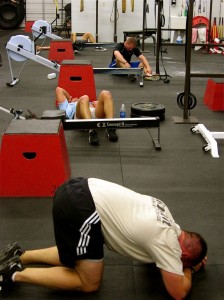 I’ve seen CrossFit create a beautiful kind of community that spans the gaps created by age, race, and body type.
I’ve seen CrossFit create a beautiful kind of community that spans the gaps created by age, race, and body type.
Because CrossFit is scaleable, people with radically different levels of fitness work out side by side. We may all lift different weights, jump on boxes of different heights, and run at our own pace, but if we push ourselves to the limit, at the end of each WOD we all end up at the same place—flat on our backs. After the initial recovery, we form a circle to stretch and cool down. There are nods of affirmation, fist bumps and high fives, and once we recover the power of speech, the phrases “good job” and “nice work” make their way around the circle.
Over time, mutual respect develops as we watch each other struggle and suffer through particularly difficult workouts that isolate and expose our weaknesses. At times, we all find ourselves wanting to quit in the middle of a workout. Whether it’s because we’re having a bad day or because we’re training a weakness, we sputter along while everyone else is powering through the workout. The (unwritten) CrossFit code says that we don’t quit in the middle of a WOD unless we’re injured or lose capacity in one or more of our five senses. This means we keep suffering through a workout while everyone else who has already finished cheers us on. It’s both humbling and encouraging when the early finishers gather around and motivate you to keep going. When we finally finish, they have a deeper respect for us because we didn’t quit, and we have a deeper appreciation for those who kept cheering. We know we wouldn’t have made it without them.
Several years ago I had a neighbor who was a veteran of the Vietnam War. One evening we were chatting about his experiences and he said, “Over the past 30 years I’ve been in and out of V. A. hospitals for all kinds of mental stuff. I tell you, if you gave me a chance to go back to Vietnam and walk the jungle again with my buddies, I’d do it in a heartbeat. I miss being with those guys. I miss the camaraderie.” He is still haunted by his memories of the war, but he longs to go back and endure the hell of combat if it means he can experience a deeper kind of human connection than he can find living in his safe, quiet neighborhood.
The intensity of wartime camaraderie is an experience reserved for a select few. I’ll not cheapen their experiences by suggesting that we can manufacture or duplicate something similar in a time of peace. Still, most of us long for a deeper connection with others than is afforded by the superficial relationships of suburbia.
Anthropologists call this deeper kind of community “communitas.” Communitas is forged when we share difficult experiences with others. We see communitas emerge in multiple venues when groups experience and overcome adversity together. We see it in business when a team of entrepreneurs overcome obstacles to make their dream a reality. We see it when a family rallies around a loved one who has been diagnosed with cancer. We see it when in a group of Christians are being persecuted for their faith. Difficult circumstances draw people closer together.
What I see happening everyday in a CrossFit gym is a diverse group of athletes coming together and engaging in voluntary shared suffering. The result is a surprisingly deep level of camaraderie. It’s not combat or persecution or cancer or a start-up company. It a small slice of the day when people softened by the comfort of their suburban lifestyles shock their system with some good old fashioned physical and emotional pain.
It makes us stronger; it also draws us closer.



